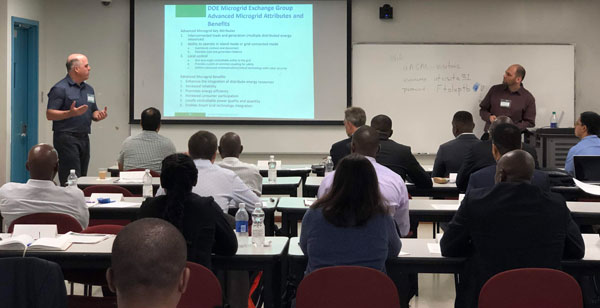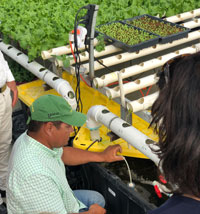In 2017, the disastrous hurricanes Irma and Maria killed thousands, destroyed homes and businesses and left thousands homeless in Puerto Rico, the U.S. Virgin Islands, Dominica, Barbuda and other island nations in the Caribbean.
The hurricanes also exposed a massive problem: the lack of resiliency in the electrical grids that the small, isolated islands rely upon to keep the power running.
Many parts of the Caribbean were without sustained power for months following the hurricanes, despite government aid and help from the energy providers who sent experts and equipment to bring power back online.
Enhancing energy resilience

Sandia and DOE recently hosted the Advancing Caribbean Energy Resilience workshop at the Universidad Ana G. Mendez’s Gurabo campus in Puerto Rico, where researchers, engineers, policy makers and utility representatives met to discuss how to enhance and improve energy resilience throughout the Caribbean.
Led by Sandia, the workshop included speakers from the DOE, the Organization of American States, the Caribbean Community, the National Renewable Energy Laboratory, energy providers, professors from the Universidad de Puerto Rico at Mayaguez and regional stakeholders.
About 50 participants, stakeholders and experts from 15 countries across the region learned about the tools and methodologies to address energy resilience through the application of microgrids.
The workshop was organized through the State Department’s U.S.-Caribbean Resilience Partnership, whose goal is to develop and advance resilience in the Caribbean region.

The workshop showcased design tools and methods developed by the DOE and its national labs, such as Sandia’s Microgrid Design Toolkit. The workshop shared best practices developed and disseminated through DOE’s Energy Transitions Initiative that can be applied to island electric grids.
Participants also learned about the governance, institutional and financial considerations necessary to develop strategies that ensure resilient electric supply to critical infrastructure.
As a part of the workshop, participants visited the El Coqui community and met with leaders who are working on energy resilience solutions there.
“Presentations at the workshop gave participants an idea of how microgrids and energy resiliency can benefit their countries and communities,” said Matt Lave of Sandia. “While the workshop focused on the technical and regulatory aspects of microgrid development, we felt it was important for the participants to understand the community motivation by interacting with those residents and leaders who are currently developing energy resilience solutions.”